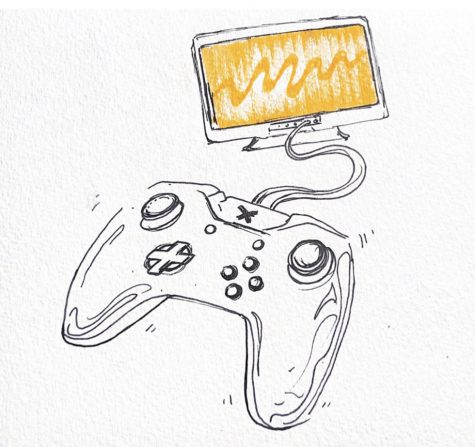Grappling with nostalgic and problematic legacies
April 29, 2021

Over a year and a half ago, I sat down to write a story about how I interact with content after its creator has been accused of abuse. The creator I mainly referenced passed away shortly before the article was about to go to print, so I didn’t publish it. This is what became of that piece.
It’s now less so about the first creator I had in mind, and more about the persistent trend in creative media where the beloved or nostalgic legacies of popular works are twisted up in the complicated or downright problematic legacies of the people who made them.
In 2019, several prominent names in video game development, production and composition were accused of sexual misconduct and abuse by fellow industry professionals. The one that struck me the hardest was against Alec Holowka, famous indie developer and co-creator, coder and composer of the game “Night in the Woods.”
“Night in the Woods” is one of my favorite games of all time. It is a vibrant discussion of just how much we matter in the grand scheme of the universe, set against a beautiful art style and accompanied by a delightful score.
I found and first played “Night in the Woods” as a lost and struggling college student facing one mental health crisis after another, and immediately saw myself in the game’s main character, Mae.
In her first year of college, Mae had experienced significant mental health issues and dropped out. The game centers around her return home and feelings of insignificance in her small town. The game meant a lot to me, and still does.
“Night in the Woods” co-creator Scott Benson took to Twitter after the allegations to announce that the three-person development team (consisting of Benson, Holowka and Bethany Hockenberry) were parting ways with Holowka, and urged fans to hold on to the game.
“Thousands of people have connected with Night in the Woods in a very personal way. Whatever you’re feeling is valid. Your experience with art is yours. What it means to you is yours,” Benson stated in an Aug. 28 tweet.
But in the wake of horrific allegations against one of the people directly responsible for the game’s creation, my feelings on the game have been murky at best. Holowka passed away shortly after the accusations came to light, and I haven’t played the game since.
Though accusations against Holowka were years ago now, the question of whether or not it’s okay to enjoy the creation of someone who has done something downright awful stuck with me for a while. This may be because there are ever-present instances of sexual misconduct, abuse, racism and discrimination by famous authors, musicians and more popular modern creators.
In 2020, author JK Rowling was accused of (and then doubled down on) transphobia due to a series of tweets. Comedian Chris D’Elia was accused of sexual impropriety by several women. Actress Lea Michele was accused of harassing and subjecting her “Glee” co-stars to microaggressions.
The list goes on and on. So, this all leaves me with a question. Is it actually possible to separate the art from the artist? And even if it’s possible, is it ethically reasonable to? To be honest, I don’t know.
I believe that music, shows, books, video games and any form of art are always going to be byproducts of the people who made them. All of their experiences and all of their biases feed into their creations—their beloved content wouldn’t be the same if it were created by anyone else. In supporting a game or a book series that I love, I’m also supporting the people who contributed to it, shitty or otherwise.
To deny that something I care about was made by someone who has done or said horrible things would be unacceptable and dismissive to those the creators have hurt. The voices of their victims matter far more than my feelings on a hobby of mine.
I recognize, however, that cutting ties completely with a work that is of great emotional significance to us is easier said than done.
When it comes to “Night in the Woods,” I legitimately do not know how to rationalize my love for such a beautiful and emotionally resonant game with the reprehensible actions of someone who helped create it. I don’t know if it’s possible.
As of right now, I believe the only wrong answer in this discussion would be to ignore the actions of a creator just so you feel better about enjoying their content.
Dismissing or excusing accusations of sexual abuse, racism, transphobia or anything else that actively hurts someone else in order to make enjoying something more comfortable and convenient for you is the worst-case scenario.
Letting go of something you care about because of the actions or words of who made it hurts. I don’t think it’s something I can feasibly demand. But the only thing we can’t do is ignore the voices of those hurt by our favorite creators, and we can’t ignore the ways in which the views of a bigoted or abusive creator have informed their work.
The icon for “Night in the Woods” still sits in my game library. It’ll stay there, for now, until I can either make myself open it or delete it.






